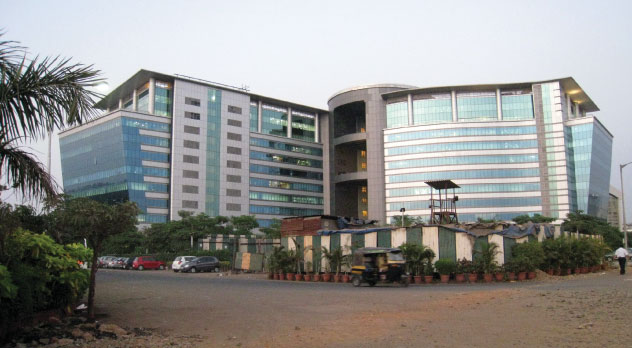SUBCONTINENT:
India Calling: Reverse Brain Drain Gathers Steam
India is emerging as the hotspot for job seekers, both for fresh graduates and senior executives, writes Siddharth Srivastava.

(Above): An IT office complex in Mumbai. [Siliconeer photo]
There is increasing evidence to show that India is emerging as the hotspot for job seekers, both for fresh graduates and senior executives, further underlining what has been termed as “reverse brain drain.”
India has turned into one of the most sought destinations for expatriates, both Indian origin and foreigners) for top jobs, a study of high level recruitment trends by U.S.-based SpencerStuart, a leading executive search firm that deals in hiring CEOs, presidents and COOs for companies worldwide, has said.
“That is because big business houses in India are ready to offer pay packets that are equivalent to and sometimes more than global benchmarks.”
Another study has revealed that the number of graduates from the vaunted Indian Institutes of Technology (IITs) seeking to move to the U.S. for employment opportunities, has drastically reduced.
The study ‘Changing Career Destination and Career Choices for IITians’ by Evalueserve, a lnowledge process outsourcing firm, says that in the last five years, almost 85% of IIT graduates have opted to stay back and pursue a career in India.
According to the study, this “reverse flow” began in 2002, with only 16% going abroad in the period till 2008. In contrast, between 1964 and 2001, 35% IIT graduates preferred to work in the U.S.
The study says: “59% of IIT graduates before 2001 believed that the U.S. and other developed countries provided better opportunities. However, in the last five years the mindset has changed. Now, nearly 50% say India is where the action is. The number of IIT graduates who believed that the U.S. offered a better standard of living, too has come down from 13% prior to 2001 to almost zero now.”
Job losses, high unemployment rates and the sub-prime lending crisis in the U.S. have had a negative impact.
Interestingly, when asked, “10 years down the line, which geography do you think will hold the most promise for success?” 72% picked India, with only 17% pitching for USA, 5% for Europe and 2% for China.
Indeed, the India story is not limited to entry levels only. SpencerStuart says that Indian companies in important sectors such as retail, real estate, power, oil and gas and refining, transportation and logistics, are offering annual salary packages ranging from U.S. $750,000 to U.S. $1.5 million that excludes stock-options, to top employees.
Nearly half the CEOs and COOs recruited in these high growth sectors are foreigners (including non-resident Indians).
“Expats are finding India a more exciting market in which to work than mature markets. Large Indian companies in certain sectors are willing to match if not better global salaries to get talent which is difficult to get in India,” says the report.
|